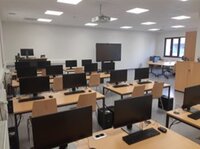
Prof. Dr. Andreas Berl
Dekan
- Dekan der Fakultät für Angewandte Informatik
- Studiengangskoordinator des Masterstudiengangs Artificial Intelligence and Data Science
Sprechzeiten
Montags von 13 - 14 Uhr
Labore
Deep Learning KI-Labor (Deggs)
Kernkompetenzen
- Elektromobilität und Flottenmanagement
- Virtualisierung und Energieeffizienz
- Intelligentes Energieinformationsnetz (Smart Grid)
Forschungs- und Lehrgebiete
Projekte
- SmiLE - Smartes und integriertes Laden von Elektrofahrzeugen auf Firmenparkplätzen https://zaf.th-deg.de/public/project/183 Bayerische Forschungsstiftung 05/2020 - 04/2023 (3 Jahre)
- MAID - “Master Studium Künstliche Intelligenz und Data Science” https://zaf.th-deg.de/public/project/114 EU, INTERREG 03/2019 - 12/2022 (3,75 Jahre)
- CITRAM - “Citizen Science for Traffic Management” https://zaf.th-deg.de/public/project/101 BMVI - mFund 09/2018 - 11.2020 (2 Jahre)
- SMART-vhb - “Java Programmierung” Virtuelle Hochschule Bayern https://smart.vhb.org 09/2019 - 10/2022 (3 Jahre)
- Smart Grid - “Smart Grid-Technologien für ländliche Gebiete und KMUs” http://www.smartgrid.science EU, INTERREG 04/2017 - 03/2020 (3 Jahre)
- WVDI - “Workstation-based virtual desktop infrastructure” https://zaf.th-deg.de/public/project/54 Sonderforschungsprojekt der THD 01/2017 - 12/2018 (2 Jahre)
- Electrific - “Enabling seamless electromobility through smart vehicle-grid integration” https://www.electrific.eu EU, Horizon 2020 09/2016 - 08/2019 (3 Jahre)
Vorlesungen
- Grundlagen der Informatik
- Einführung in die Programmierung (in C)
- Programmieren I (in Java)
- Programmieren II (in Java)
- Architekturen für vernetzte Softwaresysteme
- Netzwerktechnik und IT-Netze
- Projektmanagement
Vita
- seit 2022 Dekan der Fakultät für Angewandte Informatik
- seit 2021Studiengangskoordinator des Masterstudiengangs Artificial Intelligence and Data Science
- 2019 - 2024 Mitglied der Prüfungskommission der Fakultät für Angewandte Informatik.
- 2019 - 2022 Mitglied des Fakultätsrats der Fakultät für Angewandte Informatik
- 2019 Wechsel in die Fakultät „Angewandte Informatik“.
- 2018 - 2022 Inhaber einer Forschungsprofessur, verbunden mit einer Reduzierung der Lehre auf 9 SWS.
- 2015 - 2019 Mitglied der Prüfungskommission der Fakultät Elektrotechnik, Informatik und Medientechnik.
- 2015 - 2024 Fachstudienberater für den Bachelorstudiengang „Angewandte Informatik“.
- seit 2015: Professur “Grundlagen der Informatik”, Fakultät für Elektrotechnik, Medientechnik und Informatik.
- 2005-2015: Forschung, Lehre und Projektarbeit in nationalen und internationalen Forschungsprojekten, am Lehrstuhl für Rechnernetze und Rechnerkommunikation, Fakultät für Informatik und Mathematik, Universität Passau
- 2011: Promotion an der Universität Passau, Promotionsthema: „Energy Efficiency in Office Computing Environments“. Ausgezeichnet mit dem „Wissenschaftspreis der Universität Passau 2012“.
- 2009: Gastwissenschaftler am Computing Department der Lancaster University in Großbritannien.
- 2000-2005: Studium (Dipl.-Informatiker mit Nebenfach Psychologie) Universität Passau.
